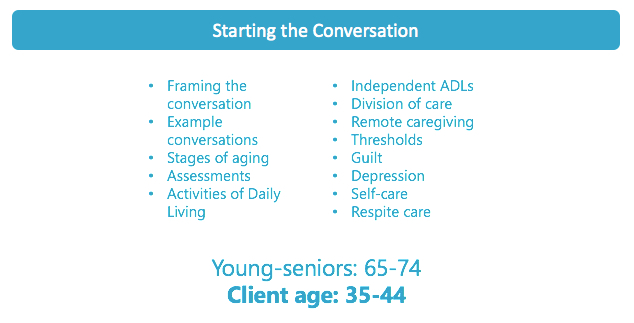You can see it coming….
Yes, we see others getting old, but it never occurs to us that it will happen to OUR parents. Until, that is, when you recognize something is not quite right or you have to confront their life-altering illness or accident.
Then it hits home! They are not going to be around forever and you have to do something! But you begin to discover that it’s not as easy as you thought. Life gets really complicated, and end-of-life decline is hard on so many levels.
You may be worried about making the wrong decision that could negatively affect your parent’s health, lead them into a bad investment where they lose retirement funds, or worse, their home. Finding answers to your questions on what you think would be simple things just seems to take forever or go unanswered. You run into dead ends all the time. Friends and so-called experts don’t provide much help as they either haven’t been in the situation or offer platitudes to “do your best, you can make it work.”
Any decision you make, you second guess, and review the options endlessly. And worse, you feel all alone in this process. Furthermore, if your relationship with your parents hasn’t been ideal, there may be old hurts or even rifts with your siblings that might hinder the consensus or decisions that smooth the way forward. First, you may need to repair relationships to assure positive outcomes.
Elder Honor is here to help you through this and aid you in honoring your parents.
The FIRST step is to Start the Conversation before you, or your parent, starts to notice something is wrong. Start that conversation now.
We will provide you tools that will help make that journey easier and give you confidence in making decisions. There will still be bumps in the road, but when you start that conversation it will allow you to get in front of decisions you will eventually have to make further down the road. It will also give you more confidence to make those decisions and your parents will appreciate that you are helping them go through this journey together, even if they don’t admit it until much later!
You will be more prepared for what is coming, and so will your family.
Here is how we help.
1. Starting the Conversation
We all have trouble talking about certain subjects with our parents. This lesson gives you the tools to think about before you start the conversation. Framing the conversation is essential; your Mom is different than your Dad, so understanding how to approach them can make it go much more relaxed. You do this with your children and spouse already, so we show you how to extend that to your parents. We give you five example conversations to get you started.
2. Assessing the Situation

Once you have started the conversation, you can now evaluate where they are with their health, home, physical, financial abilities, social life, and more. We provide you with checklists and worksheets that guide you through each assessment so you can have an understanding of where they are in each area. It also helps your parents to realize where they are and start making decisions that they may have put off for too long.
Lastly, we recognize that asking this of you and your parents may be stressful, so we walk you through how to find and hire professionals who do this for a living if needed. This can take the burden off you and help you walk with your parents on this journey. It is a journey; it may last a couple of months or several years, and we help you prepare.
3. Division of Care
As your parents’ age, there will be a lot of appointments, housekeeping, and eventually feeding and caring for their personal needs that can become overwhelming, especially if you are the only one providing care. The lesson walks you through how to divide that care up between family members and professionals to lighten that load and help you stay focused on the big picture.
We provide worksheets to divide up care and responsibilities, so everyone knows who will be doing what and when. Using these tools helps with engaging those who are still not ready to dive in to help as well as show them how much needs to be done on a regular schedule.
4. Remote Caregiving

With life comes the opportunity to move just about anywhere in the world. A new job, education, divorce, or a better experience will take you away from home for many years or even permanently. When your parent ages, you may be in a position where you need to provide care remotely, working with other family members or leveraging local resources. This was our challenge, we were on one coast, and the parent was on the other. Flying back and forth had to be planned, or it would have wiped us out financially.
This lesson outlines how to do just that, so you know, as well as everyone else, what to expect. We also talk about what the time or conditions are that may require you to travel to your parents. We provide a worksheet so you can set Thresholds to know when you need to go. Doing this ahead of time takes emotion out of the equation and allows you and others to set expectations about you being there. This Threshold sheet can be used for any number of situations as well.
5. Caring for Yourself
There may come a time when you seem so focused on providing care that you forget to care for yourself. This lesson talks about giving yourself permission to take time off, get away, and reconnect with yourself, family, and friends. We talk about where to go for help on a daily or a long term basis so you can get things done, take a spa day, or a vacation. Or, to just get away by yourself and enjoy a good cry or scream. Been there. Planning this out will reduce stress, knowing that your parent is being taken care of while you are away.
We also talk about the importance of daily exercise and hobbies throughout this time to keep you fit as well. Staying healthy during this time is the best thing you can do for yourself and your parents.
6. Estate Planning

Although we do not provide Estate Planning services, we offer a set of steps to establish an estate plan for any assets your parents might have. Yes, almost everyone has some assets that will need to be taken care of once they are gone. We recommend you work through this with your parents beforehand as it will help in avoiding the court system after they pass and reduce or eliminate arguments over who gets what. We also discuss Trusts and Insurance in the lesson to help you understand how these might work to your parents’ advantage.
7. Documents
This lesson reviews all the documents necessary to manage your parent’s affairs, and yours as an added benefit. These should be established before they are needed. We recommend you get started on these right away, as in right after you finish this course. Once created, these documents will provide everyone with a clear set of directions and instructions on how to have your parent’s wishes known by the family and who can step in when your parents can’t speak for themselves.
8. Build the Plan
Our final lesson gives you the Plan to pull all of the previous recommendations and documents together in a short time frame. We have you set a schedule of events that can be coordinated with other family members while spreading out the workload. Once completed, you will have items in place that will reduce emotion, stress, anxiety, and fear of the unknown so that you can focus on what is important – being with your parents.
Throughout this course, we provide you with over 30 checklists and worksheets to guide you through each lesson. Following these lists and sheets will help you focus on what needs to be done so that you can spend more time together.
Price $125
Here’s a summary of topics in this training.

You can see a an overview of the Complete Toolkit,
which includes Starting the Conversation, at this link.
Count the costs.
Do it yourself. Some can do this and they do a fair job of it. But at what cost? Think about time spent finding all the pieces and parts you need , trying to put them together, communicating best guess’s with your parents and siblings, and potentially not knowing what you missed. If you start now it might take several hours a night over several weeks and months. How valuable is your time, especially if you’re in the middle of taking care of your parents now? Oh, and don’t forget all the other responsibilities you have, take a minute a list them before taking this step and choose those you can drop while searching and organizing.
Hire someone. A professional’s time is anywhere between $150 to $450 per hour, you are paying for experience. You will have to hire someone eventually, but do you want to be paying all the up-front hours they will need to sort out your parents life? Do you think it would be better to walk into their office with everything in place and only have to pay for what they do best? Most of this you will be doing yourself, especially in the beginning. We help you get a head start on this work, provide you tools, and guide you through the journey with confidence.
You can wing it. Some people are really good at this, but you need to be aware of unintended consequences, and the stress, anxiety, uncertainty, and doubt that comes with that. You may also miss important aspects of caregiving that could impact your parents and you. You’ll be putting you, your family, children, siblings, aunts, uncles, and parents through some stressful times. Wouldn’t it be better to know what’s coming and have a plan to follow so that everyone knows what to expect. Think hard about this choice. I’m not sure how to measure avoiding stress and anxiety, but I know everyone wants to!
Our goal is that everyone in the family works together on this course. thereby spreading the knowledge around. It will impact your family for generations: your parents, you, your children, and their children. It is something that should be passed down for generations, to Honor your parents, so it goes well with you.
